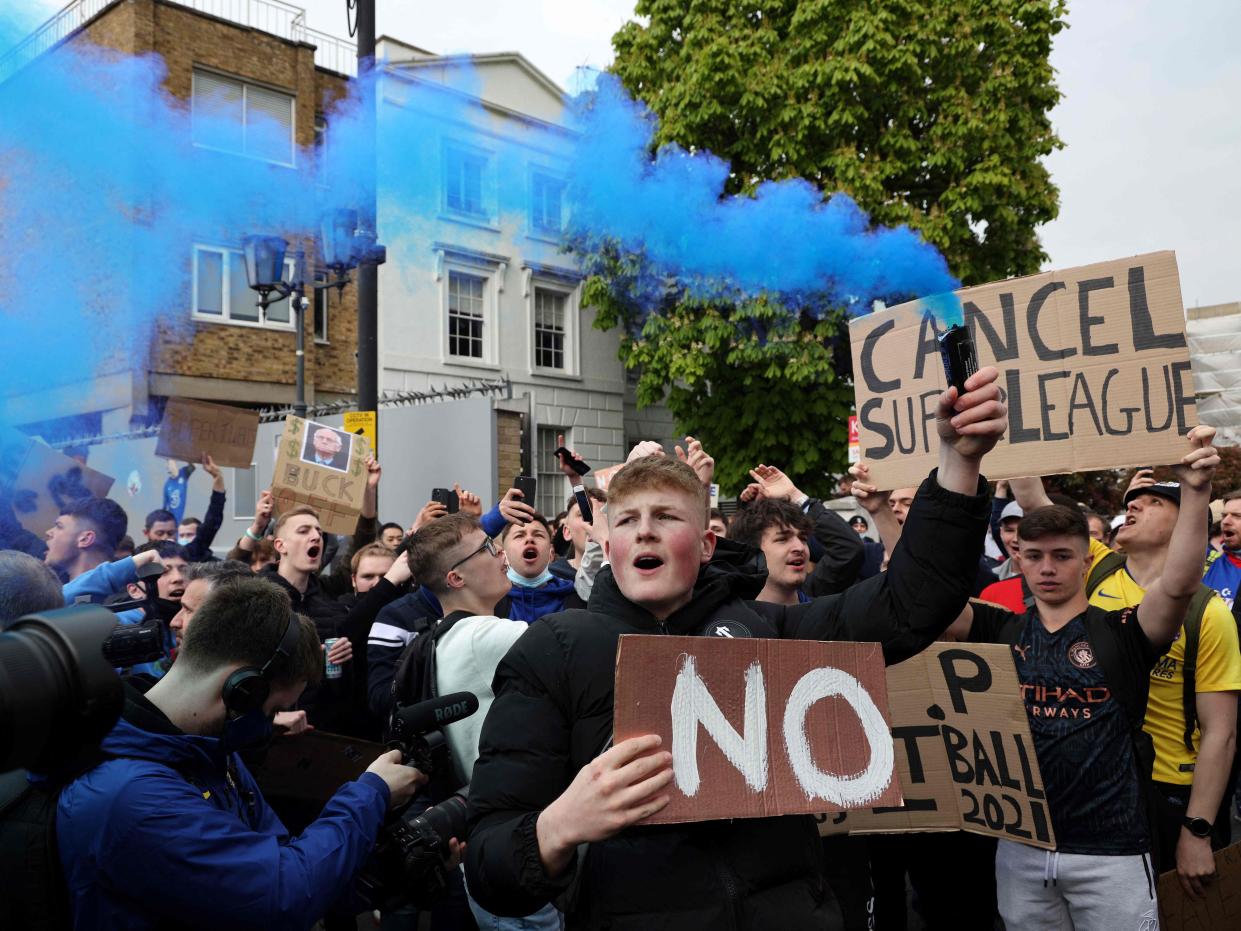People power is back – from the Super League to the Derek Chauvin verdict, politicians are listening

Power to the people: ‘Plans for a European Super League lie in tatters after furious fans expressed their discontent’
(AFP via Getty Images)People power is back. Three of the biggest stories this week have convincingly demonstrated the force of popular protest.
Plans for a European Super League lie in tatters after furious fans expressed their discontent, congregating at Stamford Bridge and Elland Road and venting their fury online.
They knew they’d got an audience when the likes of Manchester United’s co-chairman Joel Glazer and Liverpool owner John W Henry issued humiliating apologies for their role in the fiasco. These billionaires don’t do sorry without good reason. And it was the people wot won it.
As The Sun said yesterday: “This is the will of the people expressed loud and clear.”
Meanwhile, across the Atlantic, the global outrage which began less than a year ago after the murder of George Floyd found catharsis in the guilty verdict against police officer Derek Chauvin. In dozens of countries, in thousands of cities, millions of people have taken part in Black Lives Matter demonstrations, making it potentially the largest movement in American history.
The jury spoke at the end of yesterday’s trial. Due process was followed. But the people have been heard.
And even in the government’s announcement of more ambitious targets to cut carbon emissions, the influence of a shift in popular opinion has been felt. What started with a schoolgirl’s solitary protest has become a global force to be reckoned with. Now, when Greta Thunberg or Rosamund Adoo-Kissi-Debrah – who battled for years to convince the authorities her nine-year-old daughter Ella was killed by toxic air – speak, the establishment listens.
What’s striking about all three stories is the alacrity with which politicians currently in power are acknowledging the will of the people who put them there. It’s the way it should be in a democracy.
Boris Johnson and his culture secretary Oliver Dowden acted with lightning speed to denounce the European Super League. Even unelected royalty – Prince William – got in on the act. The billionaire bosses might not have crumpled so fast if the elite hadn’t followed the lead of those furious fans.
Likewise, after the Chauvin verdict, US President Joe Biden called the Floyd family personally afterwards, telling them: “We’re all so relieved.”
Of course, there are plenty of dissenting voices, with Fox News host Tucker Carlson channelling former president Donald Trump’s stance on the Black Lives Matter protests, saying yesterday’s verdict taught people that “violence works”.
It’s true that some of the demonstrations turned violent, though analysis suggests the vast majority were peaceful.
But the power of protest, the force of argument and the sheer weight of numbers has prevailed. People no longer feel impotent – and one of the things that has empowered them is social media. The toxic nature of Twitter, Facebook and the like has been much discussed, but it’s worth pointing out what a force for good these arenas can be.
Fans raised their voices at Stamford Bridge, but many more amplified that anger online. The BLM hashtag transported the fury over Floyd’s death in Minneapolis to all four corners of the globe. And Thunberg doesn’t need the full 280 characters on Twitter to get the word out – or, indeed, to wind up Trump.
So, given that social media has aided and abetted a new generation of protesters, it’s surprising just how out of touch the tech titans appear to be with the people they’ve empowered. And while politicians are eager to demonstrate they’ve got their finger on the pulse, big tech looks increasingly aloof.
The home secretary Priti Patel accused Facebook of being blind to the problem of child abuse on its platform by introducing end-to-end encryption, hampering the authorities’ safeguarding efforts.
The former children’s commissioner for England is suing TikTok, alleging it illegally collects the personal information of its child users.
Elon Musk’s Tesla was forced to issue an apology after it was accused of arrogance in its response to an unhappy customer’s protest in China. Musk sees himself as a visionary, but some of his customers, and indeed shareholders, appear to be growing increasingly sceptical.
He doesn’t seem to care what people think of him – so long as he’s successful. Twitter’s boss Jack Dorsey (who once said Musk was his favourite Twitter user) hails from the same charm school, saying he doesn’t care about “looking bad”. But these guys do need to worry about what their users make of them. After all, the customer’s always right, as one football tycoon after another has discovered to their great cost this week.
Cathy Newman presents Channel 4 News, weekdays, at 7pm
Read More
Boris Johnson calls European Super League 'a cartel'
Reactions to the European Super League are misguided – football sold its soul to greed years ago

